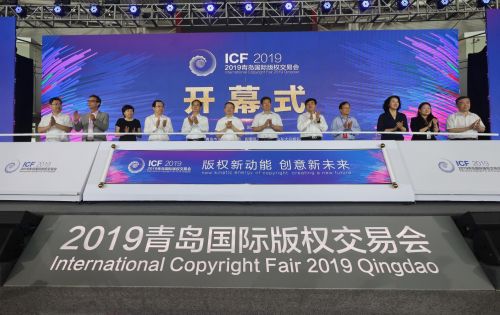Eight contracts worth 13.7 billion yuan, which is around 2 billion U.S. dollars, were signed at the opening ceremony of the event.
Qingdao's Vice Mayor, Wang Jiaxin, hopes the event will help to change the growth model of the local economy.
"We will strengthen copyright protection and promote the development of the copyright industry, to make innovation the new driving force of our economic growth. It's also good for the industrial upgrading. We've held the copyright fair three times since 2013, and it's gaining growing influence both at home and abroad."
Official figures show that China's online copyright industry was worth 742 billion yuan last year, up 17 percent on the previous year.
Steven Ma is the director of the Office of International Liaison for the California Department of Education.
He said that China has established an intellectual property system that's in line with the country's conditions, as well as international norms.
"I first came to China 15 years ago and I went to Shenzhen. It seemed that you could buy pirated goods everywhere at that time. But now, it's very different. Actually, I can feel that governments at all levels are taking strict measures on copyright protection. I think it's very important for the national economy."
In recent years, China's government has enhanced protections for intellectual property rights, including patents, trademarks, and copy rights.

DeZerlin Media is a company that focuses on Intellectual Property creation, story development, and content production for the global market.
The company was founded in 2010 in Qingdao. Frank Antonelli is the president of DeZerlin U.S.
He said China's efforts towards improving copy right protections have been recognized by the international community.
"IP copyright is important worldwide. It's interesting that as the population of the world grows, it's actually becoming a smaller world. IP is going to be shared one way or another globally. It's going to happen. And I think what we are seeing now especially in China, is understanding of that and willingness to be at the forefront of making sure that it's taken care of, protected and shared in a proper way. And that's what I'm seeing here in the expo."
156 enterprises from home and abroad are attending this year's copy right fair in Qingdao, from industries such as packaged food, publishing, animation, electronic games, and toys.
Zhang Xiao is with the Qingdao Publishing Group.
"We are adopting a new industrial model. Before, we simply lend our copyright to foreign publishing houses, and they did the translation and publishing. Now, it's different. As the sponsors, we employ people from overseas to write books about China, and they are in charge of overseas distribution. We are expanding into the overseas market through joint investment."
Last year, China's external payments of royalties for the use of intellectual property rights reached nearly 36 billion U.S. dollars, up 24 percent from a year earlier.
These royalty payments have increased, on average, by 22 percent a year from 1997 to 2018.
The payments mainly come from the electronics, telecommunication, and auto making sector, which accounted for more than 40 percent of the royalty payments.
For CRI, this is Guan Hao.












